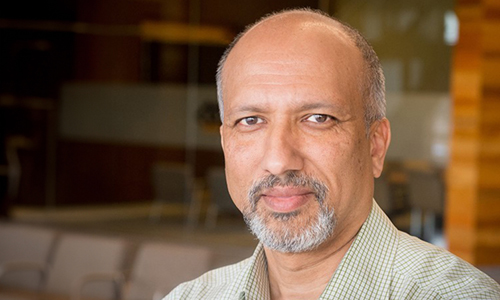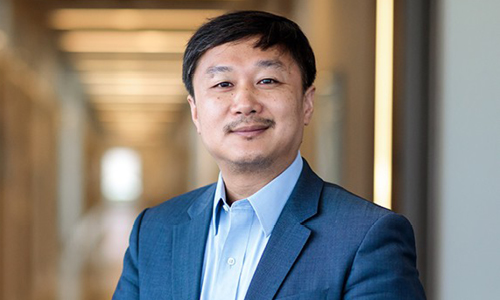|
|
|
|
| |
Engineering a sustainable future |
|
| |
|
|
|
| |
Recycled wastewater, energy efficient microelectronics, and “pluripotent plastic”: these new technologies developed by UChicago engineers are working to solve some of the most pressing environmental problems. |
|
| |
|
|
|
| |
Green engineering in the Guha Lab |
|
| |
|
|
|
|
|
| |
| |
|
|
| |
In Supratik Guha’s lab at the Pritzker School of Molecular Engineering, researchers are making strides in energy efficient electronics. Photo courtesy Pritzker School of Molecular Engineering. |
|
| |
|
|
|
|
| |
|
|
|
| |
Sustainability is the mission of Supratik Guha’s research. A professor at the Pritzker School of Molecular Engineering, Guha is developing new materials and methods to significantly reduce the energy consumption while increasing the speed of everyday microelectronic devices, like the chips inside cell phones and computers. His ideas extend to water- and soil-sensing technology through the Guha Lab’s ongoing Thoreau project. The new sensors he has developed will yield more accurate data—and a better understanding of pollution’s impact on human health. |
|
| |
|
|
|
|
|
| |
Electrifying advances, a fantastic plastic, and the inside scoop |
|
| |
|
|
|
|
|
|
|
| |
|
|
|
| Stretch, bend; mold, hold: UChicago engineers have designed a “pluripotent plastic” that can transform from stretchy to stiff and everywhere in between, adapting to a multiplicity of uses—which will be especially helpful in remote locations like space stations, sea vessels, and rural communities. |
|
|
|
| |
|
|
|
|
|
| |
|
|
|
| Take a look inside the lab of Chuan He, John T. Wilson Distinguished Service Professor, Department of Chemistry, where researchers use RNA modification to bioengineer crops with higher yields and greater resistance to climate extremes. |
|
|
|
| |
|
|
|
|
|
| |
Turning “waste into wealth” |
|
| |
|
|
|
|
|
| |
| |
|
|
| |
Molecular engineering professor Junhong Chen coleads the Great Lakes ReNEW coalition. Photography by John Zich. |
|
| |
|
|
|
|
| |
|
|
|
| |
With the aid of a National Science Foundation grant of up to $160 million over 10 years, the Great Lakes ReNEW coalition has begun a pioneering project to address freshwater scarcity through wastewater recycling. The project builds on years of research by Junhong Chen, Crown Family Professor of Molecular Engineering and lead water strategist at Argonne National Laboratory. Chen coleads ReNEW with Alaina Harkness, AM’06, executive director of water nonprofit Currents. Their approach, bolstered by collaborations with fellow molecular engineering researchers, will filter out pollutants to recycle them—for example, reconstructing waste metals into batteries and agricultural runoff into new fertilizers. |
|
| |
|
|
|
|
|
|
|
|
|
| |
| |
|
|
| |
From art to science and back again:
Uncover the creativity behind the Science as Art photography contest and more research stories that illustrate the intrinsic beauty of scientific progress.
|
| |
|
|
|
| |
Doctors and Goliath:
UChicago scientists are at the forefront of treatment for the biggest medical monsters. Read about their interdisciplinary approach to medical research.
|
| |
|
|
|
|
|
|
| |
|
|
|
|
|
| |
| |
Sign up to receive µChicago monthly. |
|
|
|
| |
|
|
|
|





